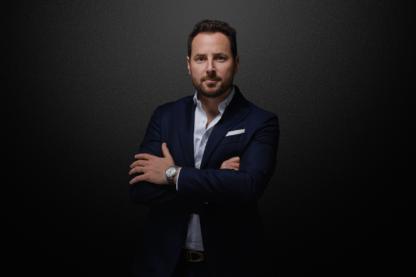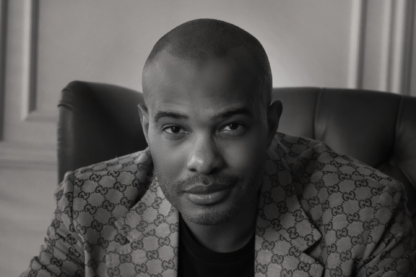In an exclusive conversation led by Alexander Chetchikov, President of the World Luxury Chamber of Commerce, renowned branding expert Markus Kramer delves into the evolving landscape of brand strategy across luxury, automotive, and financial services. As a thought leader, author, and consultant, Markus has helped some of the world’s most prestigious brands navigate the complexities of differentiation, consumer trust, and the role of purpose in modern business. From the power of authenticity to the impact of AI on branding, Markus shares his insights on how companies can craft meaningful connections in an era of radical transparency.
Alexander Chetchikov: Markus, with your extensive experience across various industries, including automotive, luxury, and financial services, how do you approach the unique branding challenges each sector presents, and what are the key similarities you look for when crafting a brand strategy?
Markus Kramer: Branding across industries may seem vastly different on the surface, but the core principles remain the same: clarity of purpose and identity, differentiation, and the ability to create genuine connections with audiences. Whether in automotive, FMCG, luxury, or financial services: brands that thrive are those that align their values and identity with the expectations of their audiences.
For example, in the high-end automotive sector, brand loyalty is often rooted in heritage, performance, and technological innovation – as well as status. Pure play luxury branding, on the other hand, relies heavily on exclusivity, craftsmanship, and the ability to create desire through storytelling. Financial services require a brand to establish deep trust and credibility, where reliability and security are hygiene – and differentiation has to come from anywhere else than an undifferentiated product or service.
So, despite these differences, the unifying factor is the need for a strong guiding purpose – what I call the “North Star” – that informs all strategic decisions. A brand must not only communicate but demonstrate its authenticity and value in every customer interaction, product, or service.
Alexander Chetchikov: As an author of The Guiding Purpose Strategy, you emphasize the transformational power of purpose in branding. How can companies integrate a strong sense of purpose without it feeling like a marketing gimmick, and what impact does this have on consumer loyalty?
MK: Purpose should not be a buzzword – it must be deeply embedded in a company’s DNA and culture. Many brands fall into the trap of purpose-washing, where they use lofty mission statements but fail to live up to them. The key is authenticity.
Truly purpose-driven brands align their internal culture, operations, and customer experiences with their stated purpose. A great example is Patagonia, which integrates sustainability into every aspect of its business, from product sourcing to corporate activism. Another great case in point is Bruno Cucinellis ‘Humanistic Capitalism”. Their commitment is real, and as a result, customers trust and advocate for them.
Consumers today are more discerning than ever. They recognize when a brand is simply using purpose as a marketing ploy. Companies that genuinely embody their purpose create stronger emotional connections, driving loyalty and long-term growth. Studies show that purpose-driven brands outperform competitors by a significant margin. In essence, profit and purpose are not opposites – they must work together to create sustainable success.
The concept of purpose is truly powerful – luxury brands have taken, albeit I am quite sure this happened mostly because of inspiring leadership and cult-like following rather than deliberately ‘looking for meaning’. And finally, genuine purpose is good for us as humans too. A recent (23-year study!) just proved that meaning is better for our health and longevity than happiness – quite impressive. Why not use it as a corporate and business lever, too – especially when culture becomes a differentiator more than ever? And when employees feel well, and stay long (loyalty), it’s a given that this binds customers too – luxury brands do this very well.
Alexander Chetchikov: As a regular speaker and lecturer at business schools and conferences, what emerging trends in branding and marketing do you find most exciting, and how do you see these trends reshaping the future of brand strategy?
MK: We are already in an era of radical transparency, and AI is only accelerating it. Consumers demand more than just quality products – they seek brands that align with their values, that are genuine and that deliver beyond function and status. This is true especially when it comes to luxury brands.
Some key trends shaping the future of (general) branding include:
- Hyper-Personalization: Advances in AI and data analytics allow brands to create deeply personalized experiences at scale, making customers feel truly understood.
- Purpose-Driven Business Models: The convergence of purpose and profit is no longer optional. Companies that integrate sustainability, social impact, and ethical business practices into their strategy will lead the future.
- Decentralization of Brand Control: With social media and increasingly AI too, customers shape brand narratives as much as companies do. Brands must embrace co-creation with their communities.
- The Shift from Ownership to Experience: Younger generations prioritize experiences over material possessions, pushing brands to focus on creating meaningful engagement rather than just selling products.
Ultimately, I believe that the brands that will thrive are those that embrace culture as a catalyst for competitive advantage, leverage emerging technologies, and cultivate deep, meaningful relationships with their customers.
Alexander Chetchikov: Your role in both consulting and ventures showcases a hands-on approach to brand strategy. Can you share an example of how your personal ventures have influenced your consultancy work, and how your real-world experience informs your advice to clients?
MK: Being directly involved in ventures provides an invaluable perspective on the challenges and opportunities that businesses face in real-time. One of the key lessons from my entrepreneurial experience is that strategy alone is not enough – execution is where real value is created.
For instance, in launching our Moving Mechanics venture that builds beautiful, kinetic time machines means understanding not just the theoretical aspects of branding but also the operational complexities, customer behaviors, and market dynamics that influence decision-making. How do you position such a brand, who is the customer, how do you find them, how do you target and convert people who love the intersection and fusion of art and mechanical engineering? Understanding the nuts and bolts of how this works is invaluable when working with clients who face similar challenges, such as Switzerland’s first wineBANK for example, a very new and very different proposition, creating not just a high-end space for wine connoisseurs, but shaping a community of like-minded people. So learning and optimizing brand building in what I am doing through the ventures where I have direct stakes in it also transfers to clients who look to build and scale their brands.
Thank you, Markus!
As the conversation draws to a close, Markus leaves us with a compelling perspective on the future of branding—where purpose, authenticity, and culture serve as the ultimate differentiators. In a world where consumers are more discerning than ever, brands that embrace their identity with conviction and execute with excellence will not only survive but thrive. His insights serve as a masterclass in strategic brand-building, reinforcing the idea that branding is not just about selling products—it’s about shaping experiences, trust, and legacy.
To gain more insights into the luxury industry, visit our expert articles and interviews: https://worldluxurychamber.com/category/expert-articles-interviews/





